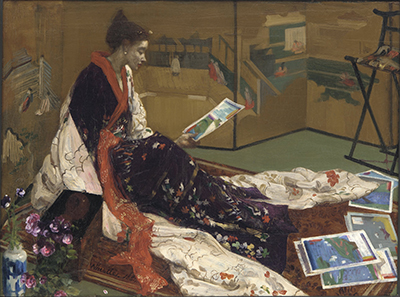Whistler might have been made famous by many paintings but this one defines his perfection. The painting was prepared and finished in 1864 as a series of recognizable work that Whistler undertook in Asian art. The painting depicts an English model in exotic costume as a Japanese lady.
The lady is surrounded by pieces of Asian art that Whistler had collected. The English model, Joanna Hiffernan, is displayed as a Japanese courtesan who is contemplating a print belonging to Utagawa Hiroshige View. The setting in the painting displayed a series of notable places of the time. The paint is described as the best designed and perfected Asian paint Whistler ever painted. Whistler had a loyal customer, Charles Lang Freer, who bought most of his Asian paints. Freer had already bought and received numerous Asian art objects and paintings but still wanted more. This motivated Whistler to start planning on the Caprice in Purple and Gold: The Golden Screen. He wanted to come up with a unique portrait that was different from all other existing Asian Arts in his gallery.
In this painting, Whistler used radical techniques that adopted Asian design principles. The Asian Principles insisted on two-dimensional flattening of painted forms and arranging them into abstract patterns. He changed the course of art history in painting by incorporating subjective feelings in his paintings. He introduced new approach to oil, canvas, pastel, watercolour, etching, and interior design of art. Whistler was very intent and specific when drawing the portrait. He used flat, simple, and expressive style in his Venice pastels. He used fluid blue and gray pigments to bring out the Asian sense in the painting. This style changed how national painters like Edouard Manet and Edgar Degas perceived art. The expressive style was successful in depicting enthusiasm of Asian art. Whistler added some elements of Aesthetic Style by use of woman in Kimono to reflect the 19th century western culture.
Whistler not only mastered the art of Simplicity and Beauty in painting, but also diversity in use of media. The painting used oil on wood panel as the media and measured 50.1cm by 68.5cm. The painting was inspired by Whistler’s love for Asian culture and curiosity in art diversity. Also, Freer is believed to have commissioned Whistler to prepare the painting due to his love for Asian art. Currently, the paint is located in Gallery 11- American Art- Freer and Whistler: Points of Contract as a property of Freer Gallery of Art.




